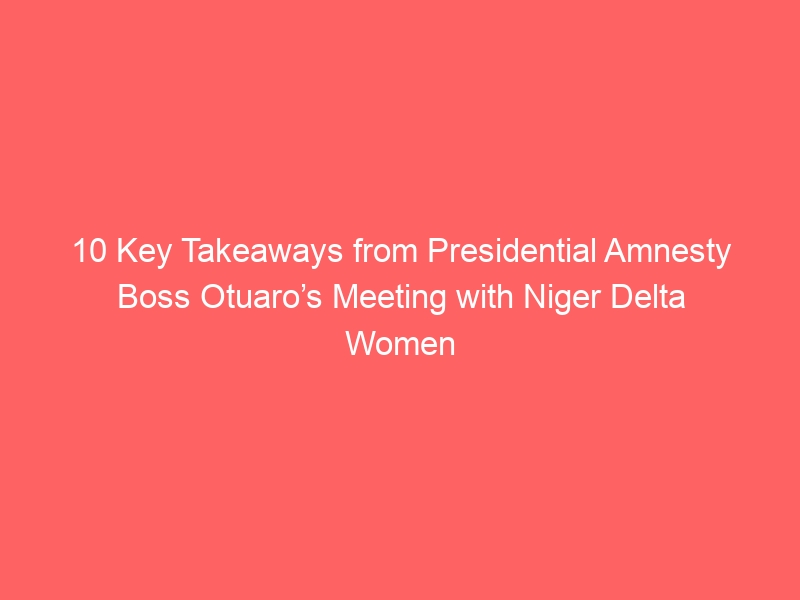During a landmark engagement session on Wednesday, September 25, 2024 in Warri, Delta State, High Chief Dennis Otuaro, PhD, the Administrator of the Presidential Amnesty Programme, met with women leaders from the Niger Delta to discuss their pivotal role in sustaining peace, driving economic development, and preserving cultural values in the region. His speech touched on critical areas such as women’s empowerment, education, vocational training, and the future of the Amnesty Programme, all while emphasizing the need for greater inclusion of women in decision-making processes.
Here are the detailed takeaways from Dr. Otuaro’s meeting with the Niger Delta women:
1. Recognition of Women’s Role in the Niger Delta Struggle.
Dr. Otuaro acknowledged the sacrifices of women during the Niger Delta conflict. Whether it was through losing their livelihoods in markets or facing violence in their communities, women were among the first casualties of the region’s turmoil. He emphasized that women were the backbone of the struggle, providing critical support to their families and communities, and that they will continue to play this vital role in maintaining peace.
“You were the backbone of the struggle, and you will continue to be.”
2. Inclusion of Women in Decision-Making Processes
One of the core messages of Chief Otuaro’s address was the shift toward inclusive governance within the Amnesty Programme. He acknowledged that previous administrations did not adequately consult women in shaping the policies that affected them, but he assured that under his leadership, women would be fully engaged in the decision-making processes, especially concerning empowerment and educational initiatives.
“In the past, your voices were not consulted in these matters, but now is the time to do it right.”
3. Expansion of Vocational Training Opportunities
Dr. Otuaro detailed the progress made in vocational training for women, noting that 1,389 women had been trained under the programme, but stressed that more needs to be done. He is committed to expanding vocational training opportunities, particularly in rural and riverine communities, where women often face barriers to education and economic participation. He urged the women to contribute their ideas on how these programs could be improved.
“I want you, our mothers, to guide us on how best to proceed with vocational training and post-training empowerment.”
4. Formal Education for Women in the Niger Delta
Education remains a critical component of the Amnesty Programme. Since its inception, 7,800 women have been enrolled in formal education programs, with 2,781 of them completing their studies at foreign universities. Otuaro acknowledged that these numbers are not sufficient, and he expressed his desire to increase access to education for more women, particularly those from underprivileged backgrounds and rural areas.
“Without our mothers and women, we cannot make progress, especially when addressing issues like low interest in education.”
5. Commitment to Bridging the Educational Gap in Riverine Communities
Otuaro unveiled plans to bridge the educational divide between students in urban areas and those in remote riverine communities. One key initiative is to provide JAMB (Joint Admissions and Matriculation Board) preparatory lectures in rural areas, ensuring that children from these communities have equal opportunities to succeed in higher education. This initiative is aimed at preparing students for computer-based exams and increasing their chances of university admission.
“We will bring JAMB lectures to our riverine communities so that rural students can compete on equal footing with those in the cities.”
6. Women as Custodians of Peace in the Niger Delta
Otuaro lauded the women for their role as the custodians of peace in the Niger Delta. He pointed out that in times of crisis, it is women who often bear the brunt of the challenges but also take on the responsibility of protecting and nurturing their families and communities. He acknowledged their strength and resilience in maintaining peace, despite the numerous hardships they face.
“When we talk about peace in the Niger Delta, it’s our mothers and women who sustain that peace.”
7. Preservation of Cultural Values through Empowerment of Women
The preservation of the Niger Delta’s cultural values was another focal point of the meeting. Otuaro stressed that empowering women goes beyond economic development—it is about preserving the cultural and social fabric of the region. Women, as the primary caretakers of families and communities, play a crucial role in passing down traditions and ensuring the next generation upholds the values that define the Niger Delta.
“When we empower our mothers, we sustain our values and culture.”
8. Support for Family Stability
Otuaro spoke of the indispensable role women play in maintaining family stability. While men may often travel far from home in search of work, it is the women who remain behind to manage the household and ensure the well-being of the family. He committed to supporting women in this critical role, recognizing their contribution as the bedrock of their communities.
“Women, no matter where they are, consistently check on the household. That’s why your involvement is crucial.”
9. Collaboration in Vocational Training and Empowerment Programs
As part of his leadership’s vision, Dr. Otuaro invited women leaders to collaborate on designing and implementing vocational training and empowerment programs. He stressed that these programs must be shaped by the real needs of women in the Niger Delta and urged the women to provide their insights and suggestions to ensure that the programs are effective and sustainable.
“I want our mothers to take over this next aspect of engagement, especially in vocational training and empowerment.”
10. Women’s Role in Shaping the Future of the Amnesty Programme
Otuaro concluded his address by emphasizing that the future of the Presidential Amnesty Programme is in the hands of the women of the Niger Delta. He called on them to continue playing a leading role in shaping the direction of the programme and ensuring its success. Their contributions, he said, are essential not only for the programme but for the overall development and peace of the Niger Delta.
“The destiny of the Amnesty Programme is in your hands, my mothers. Let’s work together to achieve success.”
By Jacob Brakere Abai












